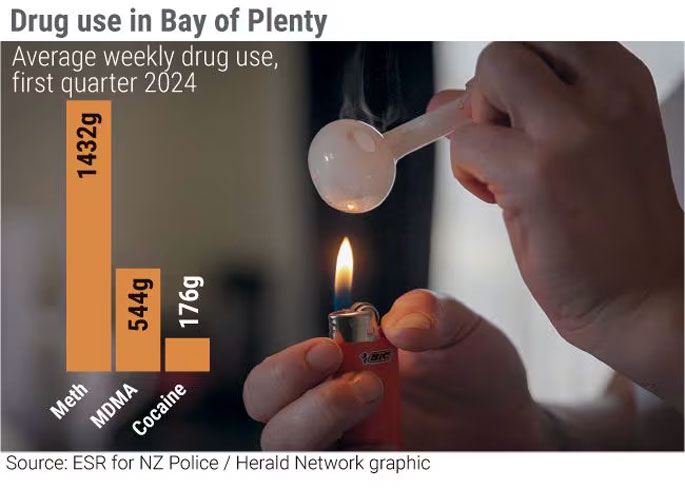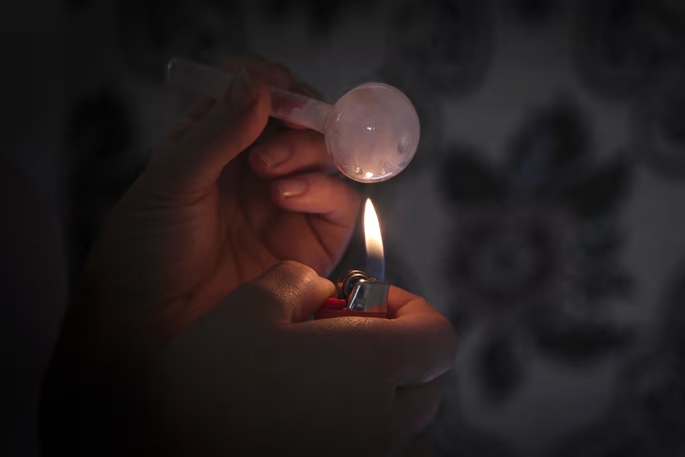Cocaine consumption is on the rise in the Bay of Plenty but methamphetamine appears to be the Bay’s illicit drug of choice, according to new police data.
The police’s quarterly report analysing wastewater across the country has found that an average of 1432g of methamphetamine is consumed per week in the Bay of Plenty.
That compares with an average of 544g of MDMA and 176g of cocaine consumed in the region each week.
Meth and cocaine reported higher consumption levels in the last quarter compared to the previous four quarters, and MDMA consumption decreased in the same period.
The wastewater testing also measures heroin and fentanyl usage but these are not routinely detected in sufficient quantities to accurately report on.

Bay of Plenty Police District prevention manager Inspector Stephen Bullock says an increase in drug consumption, as shown by the wastewater testing results, could be down to more users or users doing more drugs.
Various factors can influence the increase in methamphetamine and other drug consumption, says Stephen.
“Firstly, the growing availability of methamphetamine, as demonstrated by massive international and domestic seizures. And secondly, as shown in the wastewater testing results, regional areas display the highest use of illicit drugs per capita.
“These locations generally encounter higher rates of socio-economic deprivation and face a lack of access to social services and other localised support and investment.”
Stephen says Bay of Plenty is not immune to the effects of methamphetamine.
“We work hard to disrupt the supply of methamphetamine and other drugs as we see first-hand what impact it has on our communities every day.”
Often organised crime groups profit from harm inflicted on methamphetamine users.
“They target vulnerable members of the community with these drugs and that is why police have a strong focus on disrupting their operations.”
Police also focuse on supporting drug addicts to get the help they need, working with agencies including Te Whatu Ora, iwi, and community addiction services to address the root problems of addiction.
“Addiction is a health issue that affects a lot of New Zealanders, and it can be hard to accept that you need help.”
There are police teams in the Bay of Plenty that actively target anyone suspected of making profits selling illegal drugs.
In March, the Taupō Organised Crime Unit arrested four people during four simultaneous search warrants. Charges included more than 100 of supplying methamphetamine.
 New Zealand Drug Foundation executive director Sarah Helm.
New Zealand Drug Foundation executive director Sarah Helm.
Drug Foundation executive director Sarah Helm says an increase in drug use during the first quarter of a year could reflect the seasonal nature of some drug use. Looking at older wastewater testing reports helped gain a wider picture, Sarah says.
“Drugs are used in every community around the country. If we zoom out and look at the 2022/23 year, the Bay of Plenty has been slightly ahead of the national average for methamphetamine use (behind Waikato, Eastern, and Northland and only slightly ahead of use in Tāmaki Makaurau and Central), roughly on par with the national average for MDMA, and, again, ahead of the average for cocaine.”
Sarah says it's impossible to point to one thing to explain levels of drug use in a community.
“Drug use patterns in communities are due to a complex mix of social and economic factors, the historical and ongoing impacts of colonisation, and unique supply patterns.
“Patterns of use are stubborn and sometimes intergenerational, so we need to invest in health-based approaches that will make a difference to demand and stop kidding ourselves that we can arrest our way out of the problem.”
Sarah says the community partnership model Te Ara Oranga is a good example of this approach. It refers people using methamphetamine to health and other social services instead of sending them into the justice system where they may “suffer more harm”.
“A recent study ranked methamphetamine as our second-most harmful drug, just behind alcohol. Its highly addictive nature means that harms from methamphetamine are felt not just by people who use it, but by their whānau and their wider communities.”
Chronic use can lead to violence, relationship breakdowns and turning to crime to fund an addiction.
The NZ Drug Foundation harm reduction website The Level offers “straight-up info” on how people can stay safer using drugs, or wanting to make changes and find support, says Sarah.
Kirk Mariner, the Te Manawa Taki regional manager – mentally well for Health NZ Te Whatu Ora, says the organisation is committed to taking a health approach to address harm from alcohol and other drugs including methamphetamine.
Kirk says Bay of Plenty Addiction Services (BOPAS) had an opioid substitution therapy team and an alcohol and other drugs team.
They take care of case management and offer psychiatric assessments and medication reviews, psychology, substance withdrawal management, referral to residential addiction services, court assessments, probation assessments, five-step family therapy interventions and peer support.
There were 12 services for people seeking community help in the Western Bay of Plenty and eight in the Eastern Bay of Plenty. The number of services in Rotorua was not provided.
Kirk says the Bay’s local mental health and addiction services provided community care focused on recovery and harm reduction, including community alcohol and drug services.
They are supported by a 24-hour daily acute/crisis service and acute admission inpatient services. Other non-government organisations and iwi-led services also catered to mild and moderate-to-severe addictions.
- Suspected illegal drug activity can be reported to police by phoning 105 or anonymously via Crime Stoppers on 0800 555 111.
People can get support by calling free and confidential services, such as:
• Alcohol & Drug Helpline: 0800 787 797
• Narcotics Anonymous: NZ 0800 628632
• Meth Helpline 0800 6384 4357.
• 1737 – free text/phone to speak with a trained counsellor
• Youthline: 0800 376 633



0 comments
Leave a Comment
You must be logged in to make a comment.